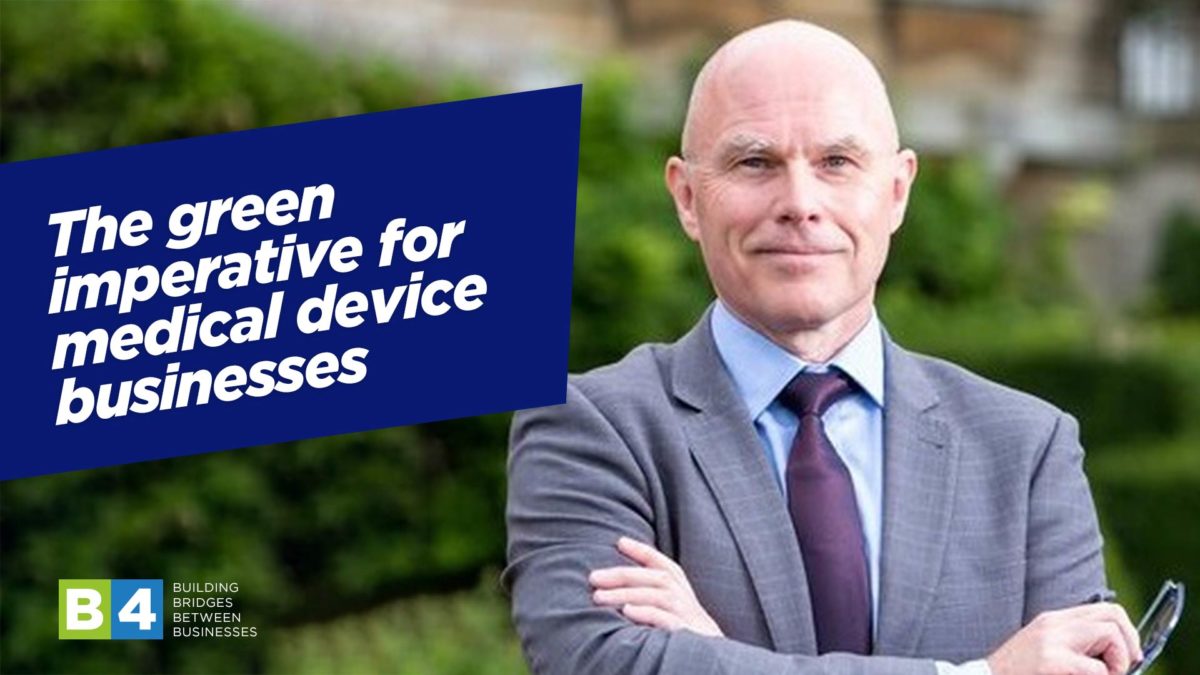
The green imperative for medical device businesses
The global healthcare system is a large contributor to greenhouse gas emissions, representing 4.4% of the total worldwide footprint.¹ Supply chains occupy a significant share of this contribution. In the UK, for instance, 62% of the National Health Service’s emissions footprint came from the supply chain in 2019.²
The purchasing power of healthcare systems can therefore be used to lower overall impact. Suppliers to hospitals and other healthcare organisations can expect greater scrutiny in this area, as green criteria increasingly feature on tenders. Board rooms can no longer avoid the issue since there may be a commercial impact of failing to review their environmental credentials.
Sustainability challenges for medical devices
The challenge for medical device businesses, however, is the need to prevent infection transmission from used products. They must be careful not to introduce new inefficiencies when recycling products or preparing them for reuse. Sterilisation, for example, requires significant use of energy while sterilants such as ethylene oxide may also have harmful effects. One effective way of reducing the overall environmental impact of a product is to review its whole lifecycle and consider where changes can be made. Can the number of components in the product be reduced? How is the product transported through the supply chain? Could the manufacturing process be cleaner? Some of the possible changes resulting from this review can also reduce business costs, such as improving energy efficiency across company premises.
Staying on track for sustainability
Once a business undertakes to improve performance in this area, there should be clear objectives that are then regularly reviewed to keep activities on track. The medical device industry is highly regulated so companies in the sector are accustomed to adhering to rigorous requirements and undergoing audits.
At Owen Mumford, we decided to take a similar approach to meeting our sustainability objectives by submitting our business to a B Corp assessment. The assessment includes over 250 questions, covering five areas of impact. Rather than solely focusing on the environment as an indicator of corporate responsibility, the ‘B Impact Assessment’ also examines company governance, engagement with the community, worker support and stewardship of customers. This was an extension of our existing commitments; to ensure that we were giving this issue sufficient attention, Owen Mumford had already set up an Environmental Steering Group in 2014, to conduct and monitor sustainability initiatives.
Achieving B Corp certification
Though we had already been actively working on improvement in this area, the B Corp review demanded additional changes to strengthen our performance. Our social and environmental commitments are now formally enshrined in our articles of association, with a new section laying out the company’s purpose. This holds us accountable to all stakeholders, ensuring we continually respect our commitment to make a materially positive impact on society and the environment through our business and operations. This extends to our suppliers, who also represent a share of our footprint, so we carried out an analysis of our suppliers, services and materials to determine material risk of contributions to greenhouse gas emissions. We have an environmental purchasing policy in place, which has now been extended across our supply chain network.
In terms of practical measures at our sites, we firstly implemented energy reduction initiatives across our global operations, in the UK, USA and Malaysia, reducing our Scope 1 and 2 carbon emissions³ by over a quarter (27.3%). Our UK sites are now predominantly powered by renewable sources, including energy we generate ourselves through on-site solar arrays. Secondly, we carried out an external air quality audit. Carbon dioxide concentration is an indicator of adequate ventilation and resulting indoor air quality. If sites are not properly ventilated, CO2 concentrations from exhaled breath can build up, making rooms feel stuffy; workers may then experience lethargy, loss of concentration and headaches. The audit also measured temperatures, humidity and carbon monoxide levels, to ensure they are within satisfactory parameters.
An ongoing commitment
Owen Mumford is among the very first medical device companies to achieve B Corp certification, joining over 400 UK companies and over 4,000 companies worldwide. The certification helps to kickstart a thorough review of business operations, which may be especially useful for companies who are unsure of where to start with their Environmental, Social, and Governance (ESG) agenda. Implementing the necessary changes may take some time but meeting ESG objectives should be considered an ongoing process. B Corp is a framework to help businesses work towards optimal benchmarks in each area, and regularly raise standards. This certification encourages us here to think carefully about defining our targets to measure real progress and to achieve what is realistic, as well as what will truly make a difference. Every person in the company is involved in this engagement, and it will help to propel future measures. The climate emergency is pressing, and so ongoing commitment from every business – whether small or large – can only be beneficial.
References
1. The Lancet Planetary Health, M.Lanzen, A.Malik, M.Li, J.Fry, H.Weisz, P.Pichler, L.S.M. Chaves, A.Capon, D. Pencheon, The environmental footprint of health care: a global assessment, 01 July 2020, Vol. 4, No. 7. doi: https://doi.org/10.1016/S2542-5196(20)30121-2
2. The Lancet Planetary Health, I.Tennison, S.Roschnik, B.Ashby, R.Boyd, I.Hamilton, T.Oreszczyn, Health care’s response to climate change: a carbon footprint assessment of the NHS in England, 01 February 2021, Vol. 5, No. 2. doi: https://doi. org/10.1016/S2542-5196(20)30271-0
3. Carbon Trust. https://www.carbontrust.com/resources/briefing-what-are-scope-3-emissions
More in Health

Helping Ordinary People do Extraordinary Things
B4 Members Hall Personal Training have recently renewed their B4 Membership. Executive Director, Becky Hall, explains more about Hall’s role in the lives of their clients and why renewing with B4 was a simple decision.

Owen Mumford: 70 Years of Innovation in Healthcare
Owen Mumford has been at the forefront of medical device innovation for over 70 years, pioneering solutions that enhance patient care and improve healthcare outcomes worldwide. Established in 1952 by Ivan Owen and John Mumford, the company has grown into a global leader in medical device design and manufacturing, with a commitment to quality, sustainability, and patient-centred innovation.

Activate Business School launches new education programme for aspiring health leaders
Activate Business School is delighted to announce it is launching a new award to help develop and train health and care staff across Buckinghamshire Oxfordshire and Berkshire (BOB).
From this author

Owen Mumford’s Near-Term and Net-Zero targets approved by the SBTi
Owen Mumford, a leader in the medical device industry and certified B Corp, has announced that the Science Based Targets initiative (SBTi) has approved its near-term science-based emissions reduction target. The medical device manufacturer has also committed to set long-term emissions reduction targets with the SBTi in line with reaching net-zero by 2045 – 5 years ahead of the UK’s net-zero target.

Owen Mumford acquires Empelvic
Owen Mumford Expands Pelvic Health Portfolio with Acquisition of Empelvic

Owen Mumford partners with Duopharma Biotech to distribute medical devices
Partnership with leading pharmaceutical company will supply diabetes and eye care devices in the Malaysia and Brunei markets

